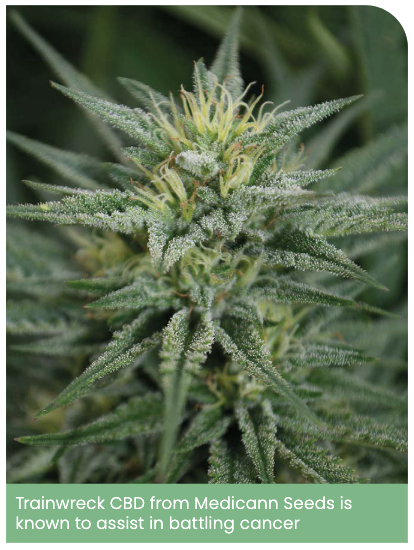Cannabis Compound Inhibits Liver Cancer Grow, By Bethan Bee Rose

Biotechnology company Can-Fite BioPharma Ltd. (NYSE American: CANF) (TASE:CFBI), has unleashed a magnificent finding upon the medical cannabis community.
The expert drug developer has announced that it will be pushing forward with a pipeline of proprietary small molecule drugs to tackle inflammatory and liver diseases.
The completion of Can-Fite's pre-clinical studies was announced on April 5. As per the findings, a CBD-rich T3/C15 cannabis fraction helps to prevent liver cancer cell proliferation. Previous accolades held by Can-Fite demonstrate the drug developer's success in treating advanced levels of liver disease and liver cancer.
Specifically, Can-Fite's drug candidate, Namodenoson, will be entered into a pivotal Phase III study in Q4 2021. Moves such as this one are helping the company to maintain its reputation as a global leader in developing drugs that primarily target the A3 adenosine receptor (A3AR).According to the company's most recent discovery, Can-Fite illustrated how a CBD-potent T3/C15 cannabis fraction restricted the growth of liver HEP-3b hepatocellular carcinoma cells via the A3AR, which led to the inhibition of Wnt- and NF-kappa B-related regulatory pathways.
To better understand what this means, it's important to clarify that the Wnt signaling pathway is acknowledged as a highly active component in managing the growth of liver cancer cells. MRS1523, an A3AR antagonist, reversed this outcome, which proved that the inhibitory effect is moderated via Can-Fite’s target, A3AR.“These findings present a novel therapeutic opportunity for cannabis derived compounds in liver cancer and further enhance Can-Fite’s assets.
Liver cancer is very difficult to treat and patients are in need of more options. Cannabinoid-based compounds may offer an effective and safe alternative for this unmet need,” said Can-Fite CEO Dr. Pnina Fishman.Patent applications have been filed by the company to ensure the legal safeguarding of its cannabinoid-based therapies whereby the A3AR target is upregulated, such as liver cancer. Since liver cancer is a leading global cause of deaths, the medical cannabis market – which is anticipated to inflate to $56.7 billion by the year 2026 – could easily surpass analyst predictions in the event that the plant is used as a treatment option.
About Can-Fite BioPharma Ltd.
Something that sets Can-Fite apart from other companies in the drug development space is the fact that this advanced clinical stage company utilizes a special platform technology that is specially designed to target multi-billion-dollar markets focused on the treatment of cancer, COVID-19 and various types of inflammatory disease. Currently, the company's leading drug candidate, Piclidenoson, is undergoing Phase III trials to determine its suitability for rheumatoid arthritis and psoriasis.
Additionally, Can-Fite's liver drug, Namodenoson, will soon be assessed in a Phase III trial for patients with the most commonly diagnosed type of liver cancer, hepatocellular carcinoma (HCC). So far, Namodenoson has been entered into a Phase II trial, for which it has successfully accomplished its secondary endpoint.
That specific trial explored the drug's efficacy at treating non-alcoholic steatohepatitis (NASH). It has gained Orphan Drug Designation in the U.S. and Europe, as well as Fast Track Designation for use as a second line treatment for HCC by the U.S. Food and Drug Administration.
In addition to liver cancer, Namodenoson has also demonstrated promise as a treatment option for other types of potentially fatal cancers, including colon, prostate, and melanoma. Erectile dysfunction is another target for the company's third drug candidate, CF602.The aforementioned drugs have exhibited an impressive safety profile, with more than 1,500 patients having participated in Cann-Fite's study's so far.
Supporting Research into the Benefits of Cannabinoids for Liver Cancer
Can-Fite's pre-clinical studies into cannabis for liver cancer are not the first to suggest that the plant's active cannabinoids can help to tackle cancer cells. Separate reports and a handful of animal studies have also shown that patients with advanced liver cancer may see their tumors shrink after consuming cannabis oil; something that is noted on the American Cancer Society's website.
Plus, in recent times, scientists have formed solid reports outlining how the psychoactive compound THC and various other cannabinoids, including the non-psychotropic compound CBD, may potentially hinder the growth of and/or cause cancer cell death, based on experiments involving lab dishes.Let's see what else the science has to say about cannabis' ability to fight liver cancer:
- Protective and therapeutic effects of cannabis plant extract on liver cancer induced by dimethylnitrosamine in mice - This fascinating study strived to evaluate the protective and therapeutic effects of Cannabis extract on dimethylnitrosamine (DMNA)-induced hepatocarcinogenicity in rodent models. Scientists discovered that cannabinoids may release their anti-tumor effects via the direct induction of apoptosis. Additionally, the plant's active compounds may decrease telomerase activity by suppressing TERT gene expression.
- Anti-tumoral action of cannabinoids on hepatocellular carcinoma: role of AMPK-dependent activation of autophagy - A team intent on finding a treatment solution for the third ranked cause of cancer-related death worldwide, hepatocellular carcinoma (HCC), authored this 2011 paper. The search for new treatments primarily covered the effect of cannabinoids on liver cancer cells. Once cancerous tissue was exposed to THC by the team, they noticed a surge in substances that cause autophagy — the natural mechanism by which the body cleans out damaged cells to regenerate newer ones.
Looking to the Future
Can-Fite notes that its recently-published press release may feature a number of predictive statements regarding the company's optimistic outlook, vision and goals pertaining to market uncertainties and risks, in addition to its product development strategies and prospects.
The company noted that "forward-looking statements relate to words like “anticipate," “believe,” “expect,” “intend,” "may,” “should” or “plan". Company officials admit that numerous factors may influence Cann-Fite's forward-looking projections. For example:
- The repercussions of the coronavirus (COVID-19) pandemic;
- Desires to obtain additional capital as a means of recovering from a history of losses;
- The likelihood of progressing into clinical trials with product candidates, as well as the prospects of completing preclinical studies or clinical trials with success;
- Competitive outlook in regards to technology, the industry and rival companies;
- Cash flow uncertainty and lack of confidence in meeting working capital needs;•Implementation of the company's business model and strategies for business and product candidates;
- The commencement, duration, progress and outcome of pre-clinical studies and trials;
- Regulatory approval confirmation for all product candidates;
- Market compliance, clinical development and commercialization of product candidates;•The company's capability to sustain strategic partnerships and collaborations with other corporations in the biotechnology space;
- Intellectual property rights protection for the safeguarding of product candidates and the company's ability to manage business without overstepping the intellectual property rights of others.
It should also be noted that Can-Fite specializes in a risky industry whereby the volatility of securities values is significantly high in comparison with other sectors. With that being said, the company's forward-looking statements are subject to change and should not be considered a certainty for investors hoping to gain financially from Can-Fite's undertakings.
You can read more about the biotechnology company's pre-clinical studies by visiting: www.can-fite.com
Written and Published By Bethan Bee Rose Weed World Magazine issue 152
















Please complete your information below to login.
Sign In
Create New Account